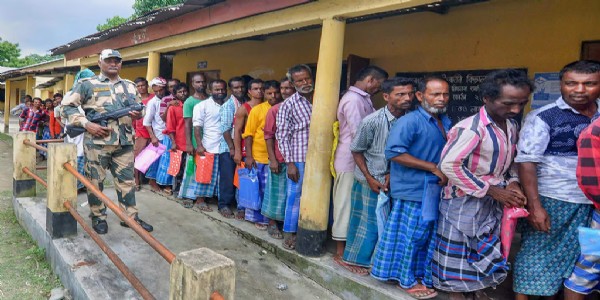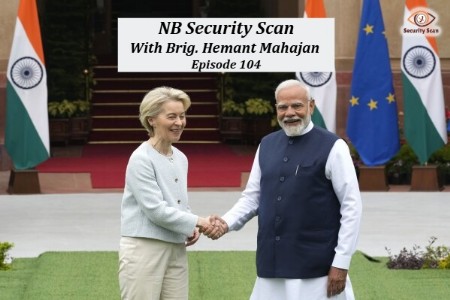#SecurityScan 41: State Of India’s Digital Security & more
The two men were allegedly operating a police outpost for the Fuzhou Municipal Public Security Bureau, a branch of China’s Ministry of Public Security.
Total Views | 303
This article is a summary of important events that have taken place in last one week affecting, India's national security.
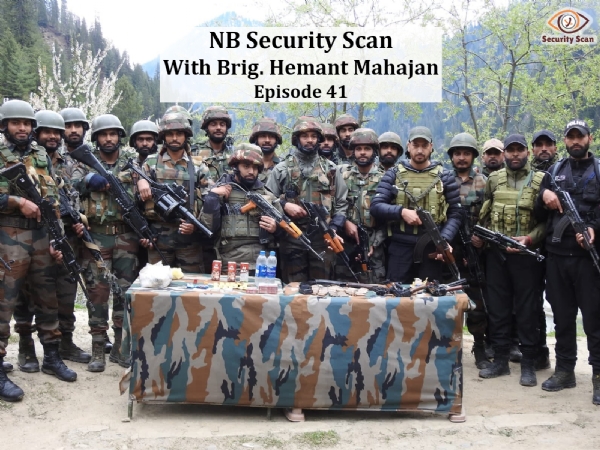
COUNTERING CHINESE MULTI DOMAIN WAR
The Long Arm of China’s Overseas Influence Operations
On April 17, the FBI arrested two men, Lu Jianwang and Chen Jinping, on federal criminal charges associated with the operation of a Chinese police outpost in Brooklyn, New York. These are the some of the first such charges against the more than a hundred overseas Chinese “police stations” operating internationally, many of them without the permission of the host country.
The two men were allegedly operating a police outpost for the Fuzhou Municipal Public Security Bureau, a branch of China’s Ministry of Public Security. Other such outposts—in Australia, France, Italy, and dozens more from Angola to Uzbekistan—have been engaged in intelligence collection, rendition of dissidents, and organizing protests against regime opponents. But the long arm of Chinese law is only one of the ruling Chinese Communist Party’s increasingly brazen efforts to collect critical information, influence global public opinion, and shape the direction of foreign political systems.
Everyone recalls, the infamous Chinese spy balloon that collected critical military intelligence as it drifted across the United States. Chinese cyber attacks have also been responsible for some of the most intrusive breaches of many government websites, including a hack into the personnel files of millions of government employees.
Whether US, EU or India, decoupling from the world’s second biggest economy is near impossible
Is it divorce or just separation, or an affair gone wrong? The United States is sending mixed signals on its relations with China. On April 20, Janet Yellen, the US secretary of treasury, ended a long list of complaints, warnings and threats aimed at China with a conciliatory message. She was quoted in the media as saying, “The US will assert ourselves when our vital interests are at stake. But we do not seek to ‘decouple’ our economy from China’s. A full separation of our economies would be disastrous for both countries. It would be destabilising for the rest of the world.”
De-risking is the new buzzword. But even that’s not easy. Major Economies are badly caught in Chinese Chakravyuvha
Economic Security-China’s Updated Espionage Legislation: A Massive Risk to Western Companies
The law will make Western companies even more wary of doing business in China—and over the past few months, they’ve already become extremely wary. In the 2023 Political Risk Survey produced by Oxford Analytica for the global insurance broker WTW, China claims the spot as the world’s second-riskiest country (measured in politically linked losses) after Russia. That marks a massive departure from recent years, which have seen countries like Iran, Venezuela, Angola and Libya top the ranking. Companies all the way up to behemoths like Apple and Samsung have already declared they’re moving parts of their manufacturing or supply chains from China to less risky countries like Vietnam.
The question is whether companies’ departure plans will be swift enough. The new espionage legislation portends an extremely perilous existence for Western companies in the country, an existence where any staff member risks arrest at any time. Businesses thought they could float above geopolitics. China’s new legislation is emphatically extinguishing any remaining hopes to that effect.
Very good opportunity for India to attract foreign industry.
Pakistan to export artillery ammunition rounds to assist Ukraine
Ukraine and Pakistan are upgrading their defence partnership with Kiev launching the process to supply Mi-17 helicopter engines and auxiliary spare parts to Pakistan military in lieu of Islamabad’s regular supply of defence equipment and tanks to Ukraine via European states. Pakistan has signed a deal worth 1.5 million USD to take supplies of Mi-17 helicopter engines and spare parts for the helicopters.
Indian-American business leader Ajay Banga appointed as World Bank President for five-year term.
President Joe Biden had said the US is nominating Ajay Banga to lead the World Bank. Biden added that the Indian-American business leader is uniquely equipped to lead the global institution at “this critical moment in history”.
INTERNAL SECURITY
Apps blocked-Imperative to rein in terror groups on the tech front
Government has blocked 14 mobile messenger applications that were being used by terror groups. Over ground workers of terrorist organisations based in Jammu and Kashmir were using these apps to circulate anti-India messages and communicate with their handlers in Pakistan.
With the help of other intelligence agencies operating in the valley, a list of such apps was prepared that pose a threat to national security and do not follow Indian laws.

Action has been taken under Section 69A of the Information Technology Act, which empowers the government to issue content-blocking orders to online intermediaries ‘in the interest of sovereignty and integrity of India.’
Even as the number of terror incidents in J&K has been on the decline, there is no scope for lowering one’s guard, as demonstrated by the Poonch ambush. An investigation into this incident has revealed that some local residents provided arms, ammunition, grenades and cash — dropped by a Pakistani drone — to the terrorists, besides giving them food and shelter. Combating the blatant use of technology by cross-border terror groups is vital for the success of efforts aimed at restoring peace and normalcy in J&K.
Various channels of communication between the terrorists and their sympathisers among the local population need to be disrupted.
EXTERNAL SECURITY
Encounter in Jammu & Kashmir's Kupwara, two terrorists killed
Indian army has killed two terrorists in Kupwara of Jammu and Kashmir.
Focus on emerging threats of VBIEDs, attacks around G-20 meet in Kashmir'
The Jammu and Kashmir police have directed ground officials to remain alert against potential vehicle bound IEDs, fidayeen attacks, and grenade attacks in the wake of G-20 meeting scheduled later this month. Measures include marine commandos for providing stronger security around water bodies, anti-militant operations for preventing potential threats, and counter drone teams for deployments.
Stern Message To Pakistan And China
India,which currently holds the presidency of both G20 and the Shanghai Cooperation Organisation (SCO), has been calling out the aiders and abettors of terrorism. During a conclave of the SCO countries’ defence ministers in India last week, Rajnath Singh exhorted member nations to fix the accountability of supporters of terrorism and collectively work towards eliminating it in all its forms. The stern message was primarily aimed at Pakistan, which joined the deliberations virtually, and its ally China, which was represented by Defence Minister Gen Li Shangfu.
Citing national security, the Indian government has banned hundreds of Chinese apps in the years following the Galwan clash of 2020. Sustained surveillance and pre-emptive action can give India an edge over its hostile neighbours in the technological domain.
The LAC and the danger of losing without fighting
During a meeting with his Chinese counterpart, General Li Shangfu, India's Defense Minister Rajnath Singh made it clear that China's violation of border agreements has damaged bilateral relations. Rajnath's directness, coupled with his decision not to shake General Li's hand, leaves no doubt that India is determined to stand its ground in the face of any provocation from China. The meeting provided India with an opportunity to express its views on the ongoing border standoff and the longstanding boundary dispute, and India emphasized the need to resolve all border-related issues in accordance with existing agreements.
China’s ploy to delink the boundary question from the restoration of normal bilateral ties has cut no ice with India. India has asserted time and again that the fate of India-China relations, including trade ties, hinges on the prevalence of peace and tranquility at the border.
India will have to wrest the initiative from China as far as the border crisis is concerned or else things will happen only at a time and place of China’s choosing.
Pakistan In Deep Trouble
Pakistan stands at a crucial juncture as its populous Punjab province is divided between two major national parties, the Tehreek-e-Insaf led by Imran Khan and the Pakistan Muslim League led by Nawaz Sharif, who resides in forced self-exile in London. While Imran aims to force early elections by dissolving state assemblies in Punjab and the Pashtun-dominated Khyber Pakhtunkhwa province, Chief Justice of Pakistan Umar Ata Bandal seeks to dissolve Parliament and order fresh parliamentary elections, leading to public disillusionment with the government and judiciary. The army, under Gen Syed Asim Munir, who had faced removal as the head of the ISI by Imran.
In the midst of these developments, Pakistan has sparked controversy by providing weapons to Ukraine, which has angered Russia, resulting in Moscow's denial of the supply of oil at concessional prices. China, Pakistan's "all-weather friend," has come to its aid by persuading Moscow to provide oil.
Pakistan's economic situation is dire, with the US, the IMF, and the World Bank demanding austerity measures and economic reforms before providing assistance to the country. Saudi Arabia has made its preferences known by hosting Nawaz Sharif in Riyadh. Overall, Pakistan's future remains uncertain, with its leadership and alliances in flux.
IAF chief on 4-day visit to Sri Lanka
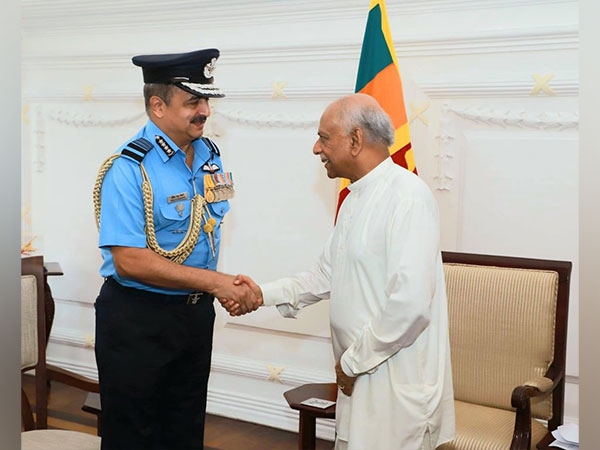
Chief of Air Staff, Air Chief Marshal VR Chaudhari on Monday embarked on a four-day visit to Sri Lanka to explore ways to boost bilateral defence ties amid concerns in India over China's attempts to expand its influence over the island nation. Chaudhari met with Sri Lankan President Ranil Wickremesinghe, Prime Minister Dinesh Gunawardena, the State Minister of Defence and the National Security Advisor, as well as the commanders of Sri Lankan Air Force and Navy. The visit resulted in the presentation of AN-32 propellers, part of India’s commitment to capacity building of the Sri Lanka Armed Forces.
Indian Navy chief Admiral Hari Kumar calls on Singapore's defence minister
Indian Navy chief Admiral R Hari Kumar, who is visiting Singapore from May 1 to 4, met the Singapore defence minister Dr Ng on the sidelines of the 13th International Maritime Defence Exhibition and Conference (IMDEX) Asia and discussed bilateral ties.
Rajnath Singh hands over Fast Patrol Vessel, Landing Craft Assault ship to Maldives
The Fast Patrol Vessel, capable of coastal and offshore surveillance at high speeds, was commissioned as the MNDF Coast Guard ship Huravee. President of Maldives Ibrahim Mohamed Solih and Defence Minister Mariya Ahmed Didi were present on the occasion.
Defence Ministry looks to rope in desi companies for upkeep of western aircraft
Indian industry is being sought to create repair and overhaul facilities for western-origin aircraft, as part of the country's 'Make in India' initiative. A capability assessment is underway to evaluate the infrastructure of interested parties. The move comes as maintenance support contracts for some western-origin aircraft are set to finish, and will test foreign suppliers that promised to transfer repair and overhaul facilities to India at the time of purchase. The Chinook, Apache and C 130J transport aircraft could also be part of the initiative.
Two Indian naval ships reach Singapore to participate in ASEAN-India maritime exercise
Two frontline warships of the Indian Navy arrived in Singapore on Monday to participate in the inaugural edition of the ASEAN-India Maritime Exercise, officials said. The harbour phase of the exercise is scheduled to be held at the Changi Naval Base from May 2 to 4, while the sea phase will be conducted from May 7 to 8 in the South China Sea.
Assam Rifles tightens security along India-Myanmar border
"We will cease most of the crossings along the Indo-Myanmar border to prevent illegal influx which is hampering the law and order situation in Mizoram," an Assam Rifles official said on Tuesday.
Supply Chain Security-India has Lithium
Recent reports of the Geological Survey of India having established “inferred” lithium resources of 5. 9 million tonnes in Reasi, Jammu and Kashmir, have created considerable optimism. There is hope that commercial mining of this resource could help India in establishing a vibrant domestic industry manufacturing lithium batteries.
But overall global demand for minerals central to low-carbon green transition – lithium, nickel, cobalt etc – is far outstripping the supply. To this list of metals, we must also add Rare Earth Elements, which are today an intrinsic part of modern devices including the screens of smartphones, the motors of computer drives and batteries of electric cars.
As far as domestic reserves of lithium are concerned, some of Indias most respected corporates should be encouraged to enter the field. The more audacious could be asked to check out in Afghanistan.
Developed countries are adopting multiple routes to secure reliable access to these scarce resources, including provisions in their trade agreements aimed at securing the supplies of these minerals from their partner countries. India should also expect to face such demands in some of its ongoing trade negotiations, particularly the FTA negotiation with the EU and the Indo-Pacific Economic Partnership Framework for Prosperity.
State Of India’s Digital Security
Last week, Haryana’s police force carried out a complex operation. Over 5,000 policemen raided 300 locations in 14 villages in the state’s Nuh district. The targets were hackers, often just school dropouts. At least 65 people have been arrested, with the hunt on for the mastermind. However, cybercrime is increasingly a leaderless exercise as a smartphone and SIM card are the only tools needed. Nuh’s geographical location helped it become a base of operations because “black spots” make it difficult to trace calls.
GoI’s cybercrime portal receives over 3,500 complaints a day. It’s a sizeable underestimate of the actual scale of cybercrime as not all victims know how to file a complaint or even want to file one.
In 2022, Interpol surveyed police forces among its member-states to publish the first-ever global report on crime trends. Police forces across countries identified financial and cybercrime as among the world’s leading crime threats. In particular, phishing and online scams were rated as high or very high threats.
For India’s huge mobile phone user base, phishing and dubious online platforms offering financial products are the most potent threats. Phishing occurs when perpetrators are able to mask their identity and persuade people to share sensitive financial information.
Digital business models offer unprecedented convenience. The downside is that it’s also made it easier to perpetrate crimes on a large scale from geographically distant locations. That makes things tough for law enforcement. In financial matters such as dubious online loan apps, both GoI and RBI have jointly cracked down.
Last year, RBI used its regulatory control over banks to ensure that the interface between the formal financial sector and dubious online lenders is checked. Here too regulators are often playing catch-up as dubious loan apps lure customers by waiving preconditions that are an essential part of borrowing from the formal financial sector.
GoI, regulators and states need to invest far more in enhancing financial awareness to help people be vigilant. India’s chronic underemployment problem, which shows up as a high percentage of self-employed people in the workforce, creates conditions for young people to try and make money by digital fraud. Jobs and smart policing are the answer.
HUMAN SECURITY
What India Becoming the World's Most Populous Country Means
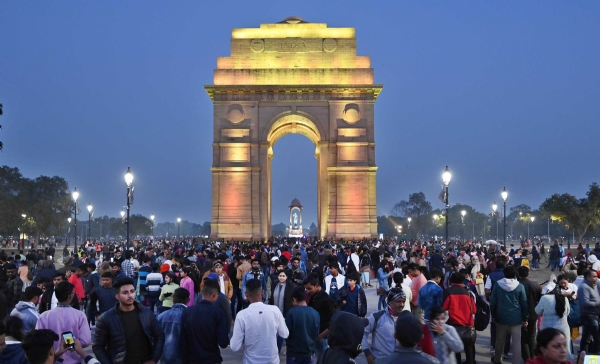
Continued population growth in India and depopulation in China mean that India is now assuming the throne as the world’s most populous country. India's leaders need to move quickly to make the most of their favorable age structure and maximize the country’s opportunities.
India’s population dynamics lay the groundwork for its future, but there is no guarantee that slower growth and a higher median age will translate to strong economic growth. If all goes as planned, the 1.4 billion and counting people in India will see rising standards of living over the coming decades. That means affordable and realistic options for consumption in India are imperative, and India can model this greener path for the younger and dynamic economies. Environmental goals can support economic goals, too, if they include investments in green labor markets and industries.
Access Denial Amid Great Power Competition: Lessons Learned from the War in Ukraine
Russia's invasion of Ukraine has left nearly 18 million people in need of assistance. Humanitarian organizations must navigate and maneuver around shifting lines of control, large scale military operations, the use of heavy weapons causing widespread damage, and complex sanctions policies. In addition, humanitarian actors are faced with sophisticated misinformation operations further increasing the challenges to provide efficient humanitarian assistance.
The prospect of future large-scale combat operations among great powers poses operational challenges to the humanitarian sector and the millions of civilians likely to be affected by such conflicts. The humanitarian community must be better prepared to respond to a potential future of large-scale conflicts. This panel will discuss the implications of geostrategic competition on humanitarian action, including on access and preparedness, by analyzing how the humanitarian system responded to the outbreak of the Russian-Ukraine conflict.
A Civilian . 'Joint Chiefs' for Economic Competition with China?
China's aggressive activities are presenting the greatest sustained challenge to the rules-based international order since the end of World War II. To posture for success in this new era, India could create a civilian equivalent to the Joint Chiefs of Staff with a mandate to manage the expanding role of Indian goverments civilian departments in geopolitical and economic competition with China.
UKRAINE WAR
Sanctions Don’t Restrict A War
The West realises well that today, it cannot physically fight Napoleonic or Hitlerian wars in Europe. Contemporary Europe faces twin debilitating factors: ‘slowest (mostly minus) growing population’ in 28 nations and lowest fertility rate in 22 countries. Direct military action by the West is impossible ,because of rapid demographic devastation and the economic damage.
West seems hell-bent on strangling Moscow through penury and starvation to a slow, painful destruction. The West seems to be keen on prolonging the macabre dance of death and destruction, inflicting colossal damage on itself.
One just has to visualise the world’s battlefields to understand how ferocious hand-to-hand fights or ‘death-wish’ combatants are a part of a nation's folklore.
Hence, the bottom line of conventional war even today, like the Russia-Ukraine conflict, is the death of countless soldiers. No nation can fight a long-drawn land war without an inexhaustible supply of able-bodied men awaiting their turn for the grave. The death of soldiers is a frightening prospect for the wealthy nations .Sanctions, therefore, are the first as well as the last resort.
Russian defense chief wants wartime missile output doubled
The Russian Defense Minister, Sergei Shoigu, has told Tactical Missiles Corporation to double its missile output to help counteract a possible Ukrainian counteroffensive, as both sides in the war face an ammunition crunch. There has been much analysis surrounding an apparent decrease in the number of missile barrages launched against Ukraine by Russia since the start of the conflict, as experts try to decide whether Russia’s supply of high-precision ammunition is running low. The US recently assessed that Russia has suffered 100,000 casualties in Ukraine since December.
--
Bharati Web





